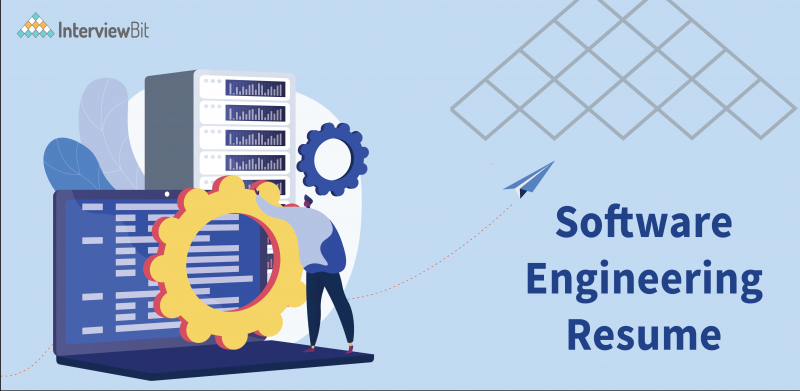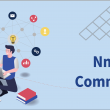- Who is a Software Engineer/Developer?
- What is the Level of Interest in this Position?
- Software Engineer/Developer Resume
- Contact Information
- Summary or Career Objective
- Skills
- Education
- Projects
- Work Experience
- Certificates and Awards
- Interests & Hobbies
- Additional Sections that can be Included
- Software Engineer Resume Sample
- Do’s and Don’ts When Writing a Resume for a Software Engineer
- FAQs
- Additional Resources
India’s IT industry is booming. Technology is advancing at a rapid pace, with new applications and advancements being developed on a daily basis. Companies are seeking software and technological advancements that can change the face of technology, as well as employees who can manage existing systems. In such situations, the scope of software engineers expands dramatically. Every business is concentrating on hiring more software engineers to create, maintain, and rework their existing technological systems.
In India, software engineering has a big potential. Software development has become a mainstream professional option in India, according to Tech World Times, with a global community of more than 26.4 million software engineers. This means that the Indian market exhibits all of the favorable characteristics that indicate that software engineering is the best career choice to pursue.
Who is a Software Engineer/Developer?
A software engineer is a computer science professional who designs, develops, tests evaluates, and maintains computer software using engineering concepts and their understanding of programming languages. Software engineers are well-versed in computer operating systems, programming languages, and software development. In order to design bespoke software solutions for clients, they use engineering concepts at every stage of the development process.
Confused about your next job?
Software developers are in charge of creating software that runs on a variety of platforms. They create application components and code from scratch for a wide range of programs, including desktop software such as Photoshop, web apps such as Twitter and Facebook.
What is the Level of Interest in this Position?
The demand for this role is at an all-time high. There has been a huge demand for software developers around the world in recent years. Its great demand can be attributed to a number of factors.
- Demand for Innovative Software: Engineers are in high demand to design websites that cater to different types of visitors. The majority of electronic devices come with pre-installed automation software.
- Rapidly Developing Technology: As technology advances, users will require new software on a frequent basis. All contemporary tech advancements such as Quantum Computing, Artificial Intelligence & Machine Learning, 5G, Hyper Automation, Internet of Behaviors (IoB), and others demonstrate the exponential expansion and progress of technology in the previous few years.
- Competition: Most companies choose to create similar applications with little differences in functionality. For example, many businesses own messaging apps, e-wallets, and other similar services.
- Wave of digitalization: Particularly in the aftermath of the global covid-19 outbreak, individuals and organisations have found that having a digital presence is no longer an option, but rather something that they must have in order to continue with their respective workflows or activities. Platforms like Uber, Zomato, Flipkart, Paytm, Zoom, and others are well-known examples of today’s digitalized world.
- Short supply of skilled engineers: Last but not least, there’s the principle of supply and demand. As a result, we must recognise that there are insufficient software engineers who are proficient and skilled in accordance with industry needs, and as everyone knows, inadequate supply always leads to high demand.
Software Engineer/Developer Resume
The first person who looks at your résumé when you apply for an engineering position at a company is, well, not a human. Companies utilize an Applicant Tracking System (ATS) to screen away from the vast majority of applicants for a position based on keyword matching.
If you pass this phase, a non-technical recruiter will look over your CV. Finally, if you pass this step, the technical hiring manager will review your resume.
How do you craft a CV that will get you through all three of these hurdles and land you that first interview? That’s exactly what this guide is here to assist you with!
A normal resume is broken out into several sections. Before we go into each component of the resume, let’s take a look at some general resume advice:
- Make your CV as long as you need it to be. It’s fine to have a resume that’s more than one page long. It’s not a smart idea to ignore important areas of your job.
- Make the section headings bigger and bolder. It’s best to use 12 points for the body and 14–16 points for the headings. Use elegant and understandable resume fonts. Choose a relevant template that presents the content in a clear manner.
- For your resume, choose a sophisticated typeface.
- Make effective use of white space. On both sides, set the margins to a single inch.
- For your experiences, use reverse-chronology order.
- Consider utilising a 1.15 line spacing or a single line spacing.
- Unless you’re specifically informed otherwise, save it as a PDF. PDFs preserve the structure of your document and may be read on almost any device.
From top to bottom, a software engineer/developer resume should have the following elements.
- Contact information in the header
- Career objective/summary statement
- Skills
- Educational qualifications
- Projects
- Workplace Experience
- Additional sections (certifications, hobbies and interests, projects etc.)
Contact Information
This portion does not require any innovation, but it does require factual accuracy. Pay great attention to this section; the last thing you want is an enthralled recruiter who wants to interview you but can’t get in touch with you! As a result, you should always double-check this section before submitting your resumes.
If you use Github for your projects you should add a link to your profile. By doing so, you will be able to demonstrate your abilities, which will help your application stand out and boost your chances of being selected for future stages. The same can be said for other platforms such as Medium, Linkedin, and so on.
The following information should be included in your contact information:
- Full Name
- Title – Match this to the job title of “Software Engineer/Developer.”
- Phone number( Check your phone number several times)
- E-mail address( Please provide your email address. Make it as professional as possible. Use a respected domain like gmail and a mix of your name and numbers)
- City and zip code(You don’t have to mention your exact address)
- LinkedIn profile
If you have a Github account, you can mention the same. Also, if you have a personal website, please share it.
A title should appear beneath your name. This should always be the title of the position you’re applying for. If you’re looking for a senior engineering position and your present title is “software engineer/developer,” you should change it to “senior software engineer/developer.”
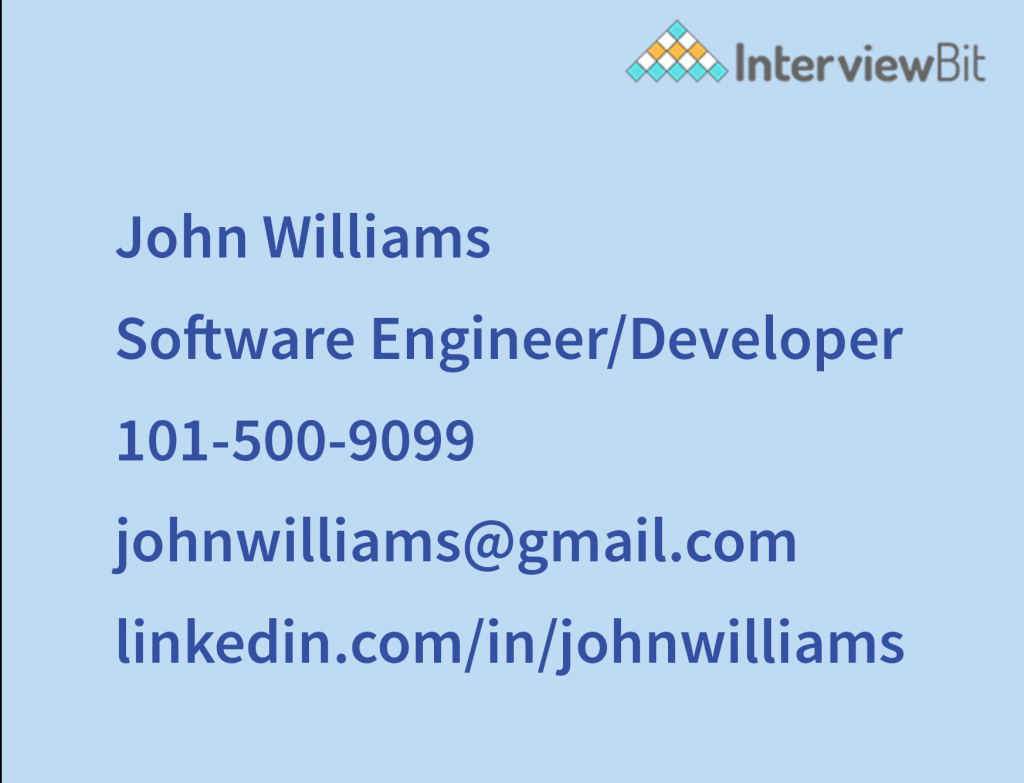
Summary or Career Objective
Recruiters look at each résumé for less than 6 seconds. With hundreds of resumes to go through, it’s understandable that recruiters will merely skim through them seeking the most crucial information. As a result, you’ll want to make the most crucial information stand out.
A resume summary or objective, which are short paragraphs that are put on top of your resume, is the best method to do this. They’re designed to swiftly demonstrate why you’re the ideal applicant for the software engineering/developer position. In an easy-to-read manner, you must summarise your years of experience, talents, and education. This section should be no more than 4-5 lines long. They can be thought of as a “preview” for the rest of your resume.
What, though, is the distinction between the two sections?
A resume summary is a two- to the four-sentence description of your professional accomplishments and experiences. A resume objective is a two- to a four-sentence summary of your career goals. So, summary or objective, which is better for your situation? In general, experienced software engineers/developers should use a summary. If you have the talents but not the industry experience, a resume objective is a good option (graduates, career changers, or those still studying).
Resume Objective
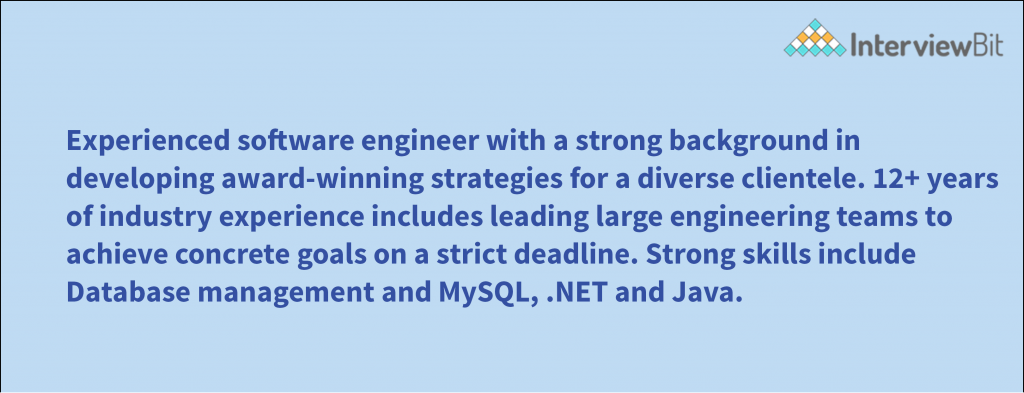
Resume Summary
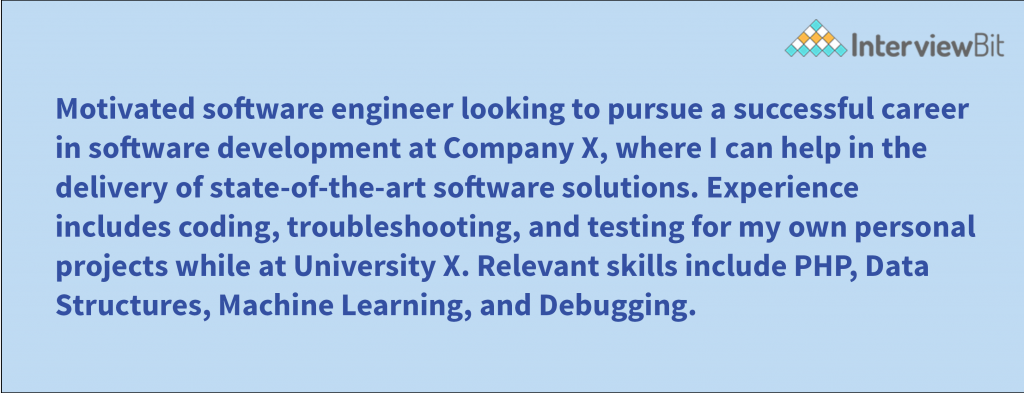
Skills
One thing your software engineer/developer resume must do is— Demonstrate that you’ll do a better job than the others. But how are you going to accomplish it? On a resume, that is, by emphasizing the relevant software engineer/developer abilities. This is done by examining the job description and comparing the required talents to the skills you already possess.
The skills area of your software engineer resume is really important. The selection of frameworks and programming languages in your skills area should not be exhaustive. If you wouldn’t feel at ease coding in a particular language or framework, don’t use it. You must also demonstrate depth in a certain language and talent. In your resume, include several references to your expertise or language. If you’re a C++ whiz, make a point of mentioning how you put your skills to use in previous jobs in the work experience part of your resume.
When it comes to structuring your resume’s skills section, you have a few alternatives. To begin, classify them according to your level of expertise. You can use terms like “advanced” vs. “familiar” or “expert” vs. “working knowledge” to categorize your knowledge. Expertise-based skills are listed first. Skills on a resume for a software engineer are categorized by proficiency.
Remember to balance soft and hard abilities on your resume. The obvious choices are computer skills, IT abilities, and programming languages. Soft abilities, such as interpersonal communication, should not be overlooked. It’s commonly known that in the tech business, soft skills are frequently disregarded, so make sure you address that demand.
We’ve put together a list of software engineer CV abilities to assist you to figure out what you should and shouldn’t include.
Soft Skills
- Time management
- Fast learner
- Organizational skills
- Communication skills
- Teamwork
- Decision making
- Problem solving
- Leadership
Hard Skills
- Computer skills
- Project management skills
- Cybersecurity
- AI
- Coding
- IoT
- Machine learning
- Debugging
- Object-oriented programming
Programming Languages
- JavaScript
- Python
- C, C++
- Java
- PHP
- SQL
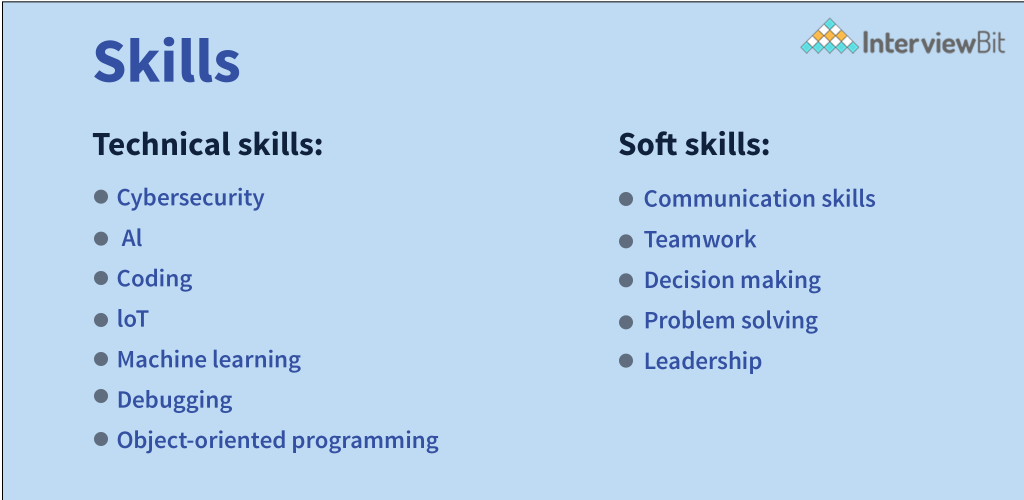
Education
Whether you’re seeking an entry-level software engineering position or a more senior position, the education part of your resume will differ. First, a list of things that everyone should include. Include the school you attended, the year you graduated, and the major you pursued. Include a minor or a specific concentration if you had one.
For entry-level applicants, relevant courses to the role you’re seeking for should be included. This includes any classes relevant to software engineering for software engineering roles. Have you ever taken a database class? It should be included. Have you finished an algorithm design course? Make certain it’s included in the resume. If you are a seasoned professional, you should: You can write only about your bachelor’s and master’s degrees if you don’t mention your education. The component about work experience will be the main focus.
Now, only disclose your GPA if it’s good and you’re applying for an entry-level developer position. On a CV, you want to put your most valuable assets in the spotlight. If your GPA is higher than 3.2, I recommend including it. Otherwise, it’s best to leave it out.
You must list your education in reverse chronological order in this section of the resume. This section may differ for newbies and experienced pros. If you’re a newbie, you might include the following details:
College diplomas (Degree name, college name, GPA score)
The intermediate school (name of school, percentage/GPA)
High school (name of school, percentage/GPA)
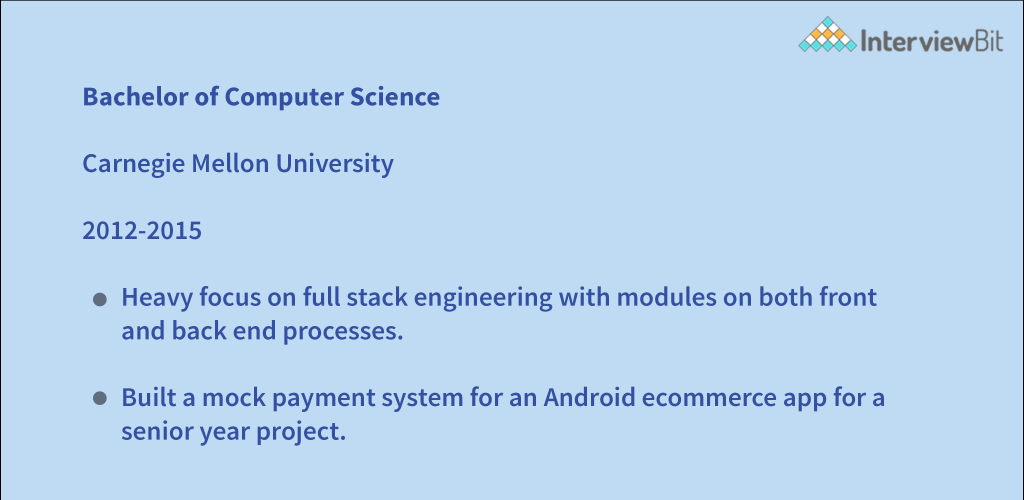
Projects
Try to discuss your projects in the same way that you would discuss your professional experience. The purpose of your projects is to show off your technical abilities in a real-world setting. Demonstrate how you used a language or framework to create something that piqued your interest or solved a problem. Include the following information for each project:
- Title
- Responsibility
- Applied technologies
- Indicate the project’s quantitative outcome.
When applying for a software engineer/developer job, the amount of your projects section on your software engineer/developer resume should be proportional to your level of experience. The more room you dedicate to your tasks, the more junior you are. If you have more than two years of experience, you should only list one project unless it is one that you are particularly proud of. The majority of your CV should focus on your previous work experience.
If you worked on significant code projects in school, you should put them here. Always try to put the work described on your CV in your Github profile or on your own website if at all possible.
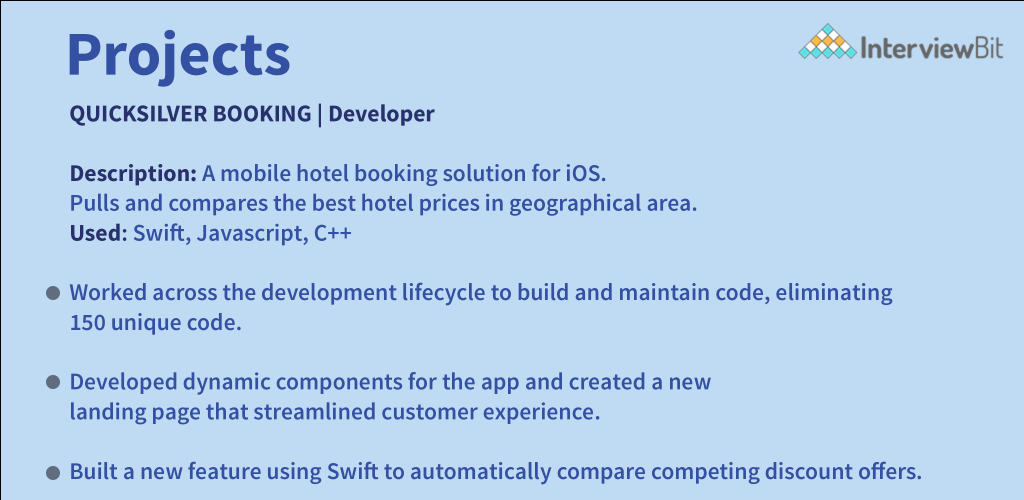
Work Experience
The work experience portion of your resume is without a doubt the most crucial. This section is more important for those with greater experience. This is not the place for humility. Show off your accomplishments. The following is the fundamental format for inputting your work experience:
- Name of the position
- Name of the Organization
- Dates
- Responsibilities and Accomplishment
- On what technologies did you work?
In chronological order, your most recent job should be listed first, followed by the job before that, and so on.
This part will now be shorter (in favor of a longer “Projects” section) if you’re a more junior engineer/developer. If you have two or more years of work experience, including internships and full-time jobs, this should take up the majority of your resume’s space. A resume reviewer will spend the majority of their time and attention on this section of your resume. They’ll decide whether or not to forward you to the first round of the interview process here.
While you don’t have to mention every detail of your experience, you should make sure that everything you do provide appears to be seamless. Gaps in your work experience section of more than six months are a significant red flag for recruiters and hiring managers. If you have a gap like this on your resume, you should definitely explain it.
Make sure that your job description emphasizes accomplishments over tasks. Employers are interested in seeing what you actually did, not just what you stated you would do. Recruiters want to know that you are capable of doing the job and that you can do it well. Your work experience is the simplest technique to instill confidence in the recruiter. Your top achievements should be highlighted on your resume to set it apart from the competition. As a result, the recruiter will be able to identify the obvious advantages of hiring you.
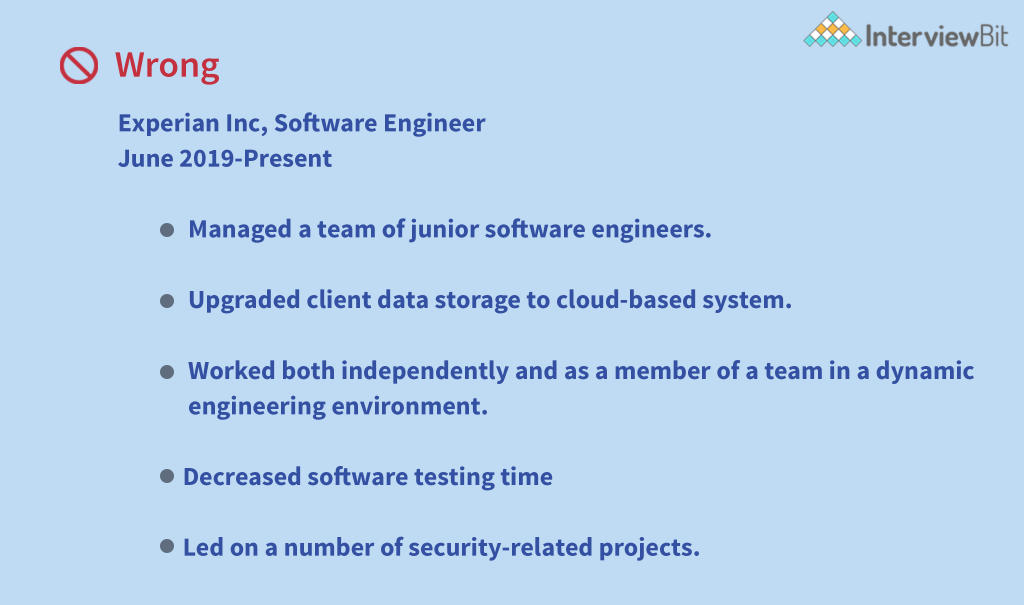
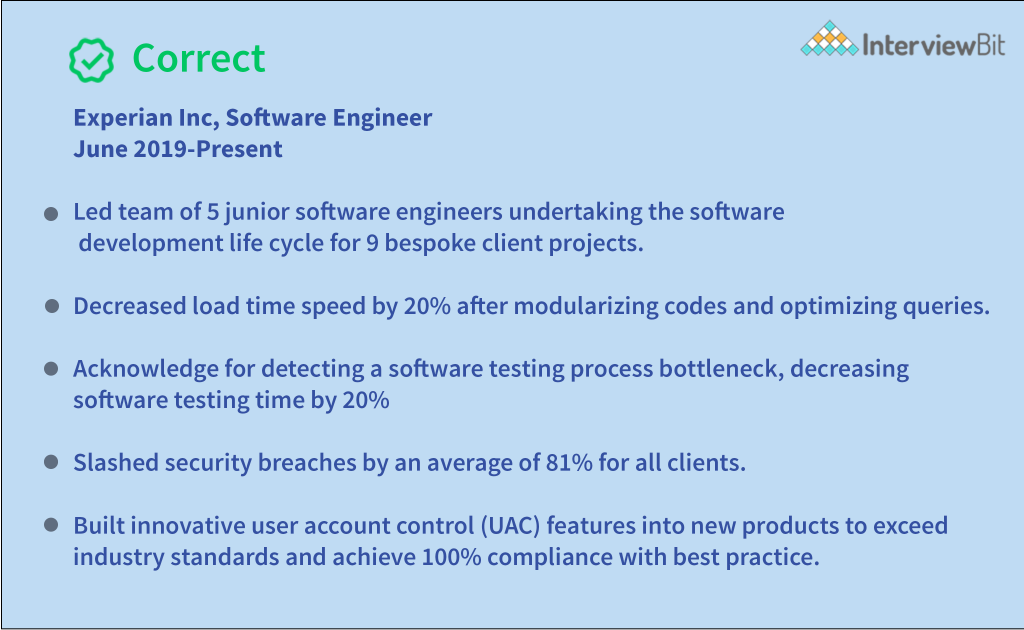
Certificates and Awards
Have you received any recognition for your engineering work?
Have you taken any courses to improve your abilities?
Make sure to include any honors or credentials you have on your CV!
Certifications and awards, including online qualifications, instantly demonstrate a certain degree of technical abilities and knowledge, especially when they are provided by a well-known organization. If you don’t have one, you can list any achievements related to programming competitions and technical exams you’ve taken. If each of you has many certificates and accolades, consider separating them into separate categories.
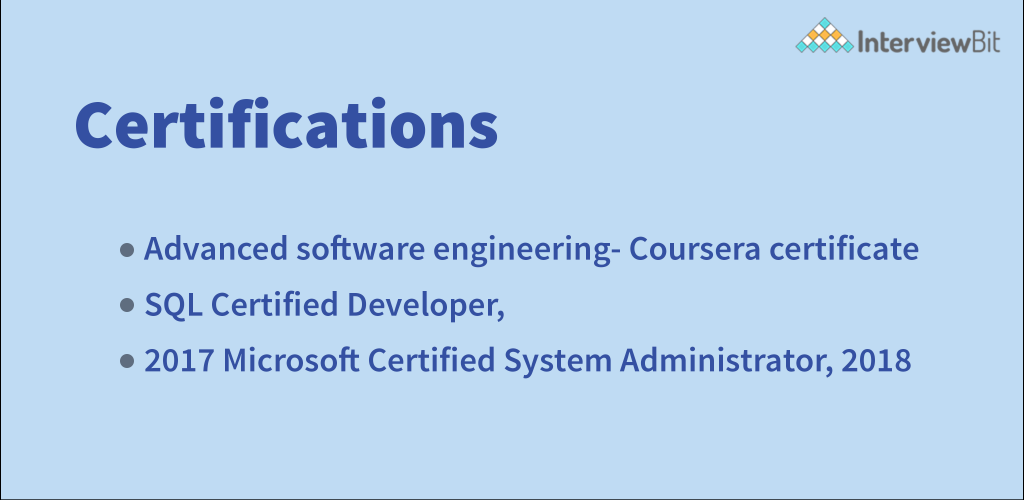
Interests & Hobbies
What does it mean for a recruiter to know about your hobbies and interests, and why would they? You might believe that. Having a list of activities assists the recruiter to have a better understanding of who you are. They can also demonstrate that you’ll fit in well with the team, particularly if you like social events.
Include a hobbies section on your resume if you have the room as an easy way to convey individuality. Before including your hobbies and interests on your resume, think about what you’re trying to communicate to potential employers. By describing your hobbies, employers can get a feel of how you spend your time and what other abilities you have.
Interests, on the other hand, may indicate topics in which you are actively researching or wish to conduct research, which could make you a good fit for the organization.
Additional Sections that can be Included
Language Proficiency
If you have room, feel free to include a language section. Including the languages you’re proficient in, as well as your level of skill in each, maybe an excellent addition – especially if you’re joining an international team! Rank the languages according to their level of proficiency:
- Native
- Fluent
- Proficient
Volunteer Work
Volunteering demonstrates your commitment, character, and principles. Any job applicant who includes a voluntary work experience area in their resume will undoubtedly receive bonus points.
Memberships & Affiliations
List professional organizations where you are a member to demonstrate your commitment to computer science, information technology, and software engineering in particular.
Software Engineer Resume Sample
Do’s and Don’ts When Writing a Resume for a Software Engineer
Here are some suggestions for what to put on your resume:
- Reflect your career strategy
The most effective resumes communicate a long-term career strategy. It’s crucial to consider your career growth and whether you’re meeting your needs while putting together your resume so that you may adjust it to your next step.
- Websites for professional networking
Recruiters frequently conduct preliminary research on prospects, so incorporating your link guarantees that the recruiter finds the right profile.
- Demonstrate your technical expertise & Don’t Forget About Your Project
Each work or project description should have one bullet point to highlight the key skills used in the project/work. One of the questions you’ll be asked during your software engineer interview will be about your capacity to work as part of a team. If you want to get the job, you need to talk about how well you operate as part of a successful group, so now it’s time to talk about how well you work as part of a successful group.
- Adapt your resume to the position you’re applying for
Targeting the role, as well as tailoring your resume to the tech requirements of a job posting, is critical. After all, the distinction between a junior and senior developer frequently extends beyond the number of years of expertise.
- Add some code to the mix.
It’s been mentioned before, but it bears repeating: open source contributions and related professional activities make a significant impact on some employers. It may even assist you in avoiding those infamous programming tests.
Here are some examples of what you should not include in your resume:
- Don’t make a list of every piece of technology you’ve ever worked with.
One issue with a too extensive résumé is that it can overwhelm hiring supervisors with information. If you list a talent or technology on your CV, you should expect to be quizzed on it. Limit your CV to those talents where you have significant dexterity and competence, rather than describing every programming language or product you’ve utilized. Otherwise, you risk humiliating yourself during the interview.
- Don’t engross employing managers in excessive details
You risk coming across as someone who can’t weigh the importance of their own work, which is a no-no for firms looking for programmers who can make a difference when it comes to prioritizing corporate goals. Your resume is not intended to be a thorough transcript, but rather to present you in the best light possible.
Take a look around you! Technology is likely to continue to advance at such a rapid rate, the future of software engineers appears bright in the coming years, with a plethora of job prospects for these professionals in the digital industry. Your CV reflects your experience, skill, and creativity, so putting in the time and effort to get it perfect will pay dividends. Remember that adapting your resume to the job description, using relevant keywords, and being clear about the facts of your experience will all help you boost your resume and land your next job.
FAQs
Q. How do I write a resume for a software developer with no experience?
Ans. Use the reverse-chronological structure while writing your no-experience resume. Instead of stressing your lack of experience, you may make a fantastic no-experience resume by focusing on your education. Include internships, soft and hard skills, and projects that are relevant. Hobbies and interests, languages, certifications, and achievements are all elements you might include on your resume. Maintain the clarity, precision, and relevance of every text on your CV.
Q. What skills do software engineers need?
Ans. If you want to advance your career in software engineering, you must first master these crucial abilities in order for your application to stand out: Continuous professional development, coding, and programming skills, testing skills, problem-solving ability, communication skills, organizational abilities, data structure and algorithm knowledge, and a keen eye for detail.
Q. How many pages should a software developer resume?
Ans. One page might suffice if you’re an entry-level software engineer. If you’re an experienced individual though, you may need up to two pages to contain all of the important details that make you a viable candidate. If your side projects resume section is making your document too long, link to an online portfolio of projects.
Q. What does a good software engineer resume look like?
Ans. A good software engineer CV should tell the story about who you are as a person.
- Customize the User (or Reader) Experience(What information about your experience does the recruiter or hiring manager need to know in order to comprehend that you’re qualified?)
- Demonstrate your technical expertise
- Be Specific With Your Achievements
- Select the Appropriate Layout
- Keep in mind the fundamentals of resume design.
Additional Resources
- Software Engineering Projects
- Characteristics of Software
- How to Become a Software Engineer
- Software Engineer / Developer Salary
- Software Developer Vs Software Engineer
- Top IT or Software Companies In India
- Software Engineer Salary
- Software Engineer Salary in New York
- Amazon Software Engineer Salary
- Apple Software Engineer Salary
- Facebook Software Engineer Salary
- Skills of Software Engineer







 Join WhatsApp Group
Join WhatsApp Group
